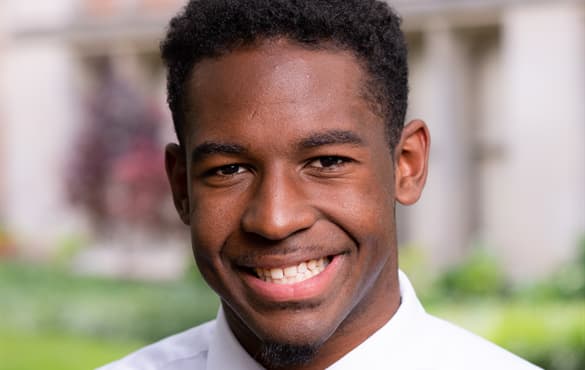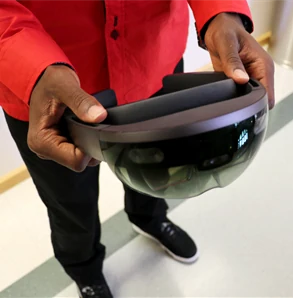WUSEF ignites love of research in junior BME student
Andrew Whitaker, a junior in the McKelvey School of Engineering, didn’t know much about research but he’s grown to love the work thanks to the summer program

Before this summer, Andrew Whitaker, a junior majoring in biomedical engineering in the McKelvey School of Engineering, wasn’t sure if research was right for him.
Like any engineer, he enjoys building things and working with his hands. He also has a natural interest in medicine and is drawn to helping people.
“What I like about medicine — why I want to be a doctor — is how you can make a difference and interact with people from diverse backgrounds,” Whitaker said.
And while he’d heard about typical research experiences, such as working with animals and performing basic lab functions, he didn’t know much about what actual research entailed. That’s why, after learning about the Washington University Summer Engineering Fellowship (WUSEF) from a classmate, he decided to apply and see first-hand what it was like.
WUSEF aims to provide students, specifically those from backgrounds underrepresented in the STEM fields, opportunities to participate in engineering research. Students can pick the research projects they wish to work on from any department within the McKelvey School of Engineering. Other benefits include social activities with faculty members and a chance to present at the annual Leadership Alliance National Symposium Research Conference.
Whitaker chose to join the lab of Jon Silva, associate professor of biomedical engineering and founder of the medical imaging technology company SentiAR. After only a few weeks, he’s already making plans to continue performing research in the future.
“What I like about research is that it’s solving a problem,” Whitaker said. “Being a doctor is great, and they do amazing work, but, in a sense, it's only a short-term fix. You see people for something like asthma, you help them and they get better; but in the long term, it would be better if no one got asthma.”

In Silva’s lab, Whitaker is assisting with new hologram technology that aims to help doctors better perform cochlear implant surgeries.
“One in five of these surgeries goes wrong because it's really hard to see what you're doing,” Whitaker said. “We've developed a way to overlay a hologram and put it on top of the ear so the surgeon can follow the hologram instead of going in blind.”
The work was challenging, requiring Whitaker to learn programming languages he didn’t already know. As a BME student, he’d only taken the prerequisite computer science classes. Overcoming those obstacles, however, heightened his appreciation for the experience.
"It was frustrating at first because I didn't know anything, and there was a huge learning curve,” he said. "But it’s a confidence booster to see that I can figure stuff out and apply my knowledge to the real world.”
Whitaker said he’s also enjoyed getting to work closely with faculty.
“Since there are so many students, it can be hard to make a connection, even if you go to office hours,” he said. “It’s cool to see what a life looks like after graduation and to get a chance to know our faculty.”
Whitaker hopes to continue working in Silva’s lab and has already started looking into graduate opportunities, including a program that would allow him to continue engineering research while earning a medical degree. His advice for other undergraduates heading into the lab for the first time?
“Expect to get frustrated. The problems aren't easy. If they were easy, they would have already been solved.”




